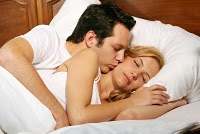Most people have heard of sleepwalking, but how many of you have heard about “sleepsex?” This is an actual condition, also known by the terms “sexual behavior in sleep”, or “sexomnia.” It refers to any sexual behavior that happens while the person is asleep of which the person has no memory. It is thought to affect only about 1% of the population and has been reported mostly in men. These episodes have been reported to last anywhere from a few seconds to up to 30 minutes. And the sexual activities involved range from loud moaning, to masturbation, to touching and kissing a partner, or attempts at having sex. There also seems to be a large range in the intensity of the behavior, but some instances of rape as well as violent masturbation resulting in bruising have been reported. Usually, partners of sexomniacs report that their partners were not responsive to them or seemed “very distant.”
Although there have been earlier references to such behavior in literature, actual studies on sleepsex did not exist before the mid-1990s. In order to better understand sexomnia, researchers conducted sleep studies on self-reported sexomniacs. What they found was that these subjects had an interruption in moving from one stage of sleep to another. It was during this interruption in the progression of the brain wave activity from one stage of sleep to another that the sex behavior took place. Since this has been demonstrated, it is now considered a medical condition rather than a psychological one. Interestingly enough, researchers found that many of the subjects reporting sexomnia had experienced it for years but had never reported it. Oftentimes it was considered embarrassing and, since so few people were aware of it, may not have seemed worthy of reporting to their doctor. Perhaps the most important reason to bring it to medical attention is that it is a treatable condition, very commonly responding to benzodiazepines such as Valium or Klonopin. Interestingly, researchers found that sexomnia is worsened by alcohol, sleep deprivation, exhaustion, and stress.
For some, sexomnia is an amusing occurrence that seldom happens. But for others, it can be quite disruptive, and as mentioned before, even violent. There have been cases of such violent masturbation that individuals would unknowingly cause themselves physical harm. They would not realize this until they woke up. Others have found that they have fondled others in the home without knowing. Because of this, it is considered the person’s responsibility to seek medical treatment – in order to prevent any untoward consequences. Also, one needs to consider the difficulty it creates for the person’s bed partner. Their sleep becomes interrupted doing these occurrences as well, which over time will seriously affect your physical and mental health.






This happened to me once with a partner who got really, really alarmed. We'd been sexually active for a while, but it still really bothered her. Other women loved it. It's a scary thing, tho. I can appreciate why my former partner didn't like it. As the male, when you realize it's happened, you feel out of control.
I had similar problems mainly after withdrawal from Benzos. I really do not want to go back to take them. I guess I just have to live with it.
It can be a difficult problem for some, and I agree that taking benzos long term is not a great solution. Unfortunately, not enough is understood about sexomnia or sleepwalking to know what’s causing it. It seems to happen more often when a person is sleep-deprived, so getting good amounts of sleep can help. Also, some have suggested that supplementing with magnesium could help – Chelated magnesium 400mg in the morning and just before bedtime. Obviously, removing anything from diet that doesn’t really belong there would also be helpful – alcohol, drugs, artificial ingredients, sugar, bad fats, too many carbohydrates.
does marijuana help ? cuz i’ve been suffering too…but i’m a girl so i guess its fun for my partner but exhausting for me because i have to go to work very early in the morning, hehe. nevertheless i started smoking periodically and in the nights that i consume i sleep without any movement.
I don’t know if there are any studies on Cannabis and non-REM sleep disorders. The problem is that Cannabis inhibits REM sleep – which is needed for the body to repair and recharge. Chamomile and lavender contain terpenes in higher concentration than Cannabis to help make you sleep. I would also look into any vitamin and mineral deficiencies that may be altering your sleep stages.